
Dr Rajendra Prasad
Credit: Wikimedia Commons/By Archives New Zealand from New Zealand - Rajendra Prasad
New Delhi: In its judgment declaring inaction by Tamil Nadu Governor on 10 bills as illegal, the Supreme Court recalled how first President Dr Rajendra Prasad initially expressed reservation over the Hindu Code Bill but backed out after being counselled by then Attorney General that he was expected to act as the constitutional figurehead only.
A bench of Justices J B Pardiwala and R Mahadevan referred to a snippet of history from the days of infancy of the Constitution and the Indian Republic, which has been narrated in the Eminent Parliamentarians Monograph Series on Dr Rajendra Prasad published by the Lok Sabha Secretariat in 1990.
In the matter concerning the constitutional role of the President in legislative processes, an issue arose during the deliberations on the Hindu Code Bill, wherein the first President of India, Dr Prasad, expressed reservations and sought to assert his independent authority to withhold assent to the legislation, the court noted.
The court pointed out, a reference was made to the first Attorney General for India, M C Setalvad, who clarified that the role of the President under the Indian Constitution was analogous to that of the British monarch and he was expected to serve as a constitutional figurehead.
The Attorney General opined that the President does not possess the authority to act contrary to the advice of the Council of Ministers.
"The opinion of the Attorney General was, with respect and magnanimity, accepted by the President and thus the ensuing controversy between the Prime Minister and the President was laid to rest. Such was the commitment shown by the stalwarts to upholding the spirit of the Constitution," the bench said.
The court also quoted Dr B R Ambedkar’s concluding speech in the Constituent Assembly in 1949 - “However good a Constitution may be, it is sure to turn out bad because those who are called to work it, happen to be a bad lot. However bad a Constitution may be, it may turn out to be good if those who are called to work it, happen to be a good lot”.
In its judgment, the court, which fixed the timeline for the Governor and the President to act bills passed by the state legislature, said "We hope and trust that the Governor and the state government would work in tandem and harmoniously keeping the interests and well-being of the people as their paramount consideration."
The court directed its Registry to send one copy each of this judgment to all the High Courts and the Principal Secretaries to the Governors of all States.
